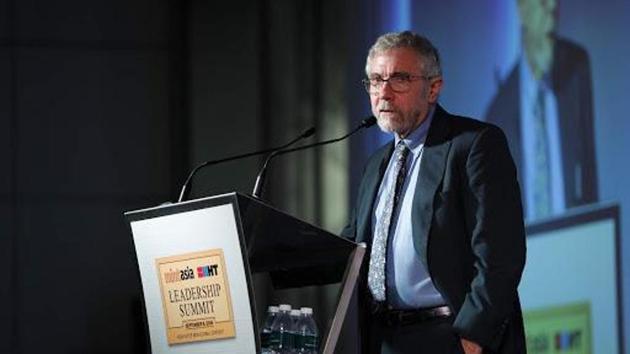Not a good time to head big business, says economist Paul Krugman
The ongoing trade war harks back to extremely high levels of protectionism in the past, with the tariffs in the United States (US) now close to 25%.
The ongoing US-China trade tensions and the ensuing uncertainty make this a difficult time for running big businesses, according to economist Paul Krugman.

“I wouldn’t want to be running a large business actually, because nobody knows at all. You’re trying to make a plan when you have very little certainty about what the global environment will look like,” he said while delivering the keynote address at the HT-Mint Asia Leadership Summit 2019 in Singapore on Friday.
The ongoing trade war harks back to extremely high levels of protectionism in the past, with the tariffs in the United States (US) now close to 25%.
“We’re also seeing that the rules of the game on trade are much more fragile than we thought. All it really takes is one major country leader who doesn’t want to adhere to the spirit of those [international trade] rules, and to have a drastic turn away from the policies that promoted a high level of globalisation,” he said.
The Nobel laureate, for one, is pessimistic about the prospects for any kind of resolution of the trade dispute.
“If you’re trying to model the future of the world trading system, you’re actually trying to model the minds of two men – [Donald] Trump and Xi [Jinping] – it’s very hard to figure that out. Both of them are leading enormous economies with enormous amounts of national pride, and neither of them is easily bullied into doing something that they don’t want to do,” he said.
The rise of Asia
Krugman acknowledged that the world’s centre of gravity has shifted “very dramatically” in the past few decades from the G7 (comprising Canada, France, Germany, Italy, Japan, United Kingdom, and United States) to Asia, adding that the US’s share of the economy was diminishing.
“And that’s where you start to worry when you see strains in the system. The question I find myself thinking is that to what extent has the rise of Asia undermined the foundations of the system that has made the rise of Asia possible,” he said.
Another drastic change that spurred the move towards globalisation was the emergence of a global value chain, something that was non-existent before the 1980s.
“By getting integrated with global value chains, countries participate in transferring technology as well. The convergence of developing countries on best practice technology was greatly accelerated by this surge in localisation,” he added.
A looming recession?
Krugman refused to predict when a recession is likely to hit the global markets, adding that no economist has ever successfully predicted a downturn.
The three big economies of the world – China, the European Union and the US – are suffering significant shortfalls in demand, with Krugman noting that Europe is being “completely useless” in forming an effective policy response.
“They [Europe] managed to achieve economic recovery, thanks to extremely aggressive monetary policy by Mario Draghi [president of European Central Bank] but the interest rates in Europe and German bonds are negative all the way out. The US has plenty of capacity to respond but is completely politically incoherent.”
“China is still very determined and effective at monetary and fiscal stimulus. It has repeatedly defied expectations of a downturn because the Chinese government has been extremely aggressive in fighting any hints of a downturn and is probably still in a position to do that,” he said.
The New York Times columnist said China needed to look inwards and improve its domestic consumption rate.
“The Chinese problem is still fundamentally inadequate consumption, which appears to reflect a huge amount of precautionary savings. Families need to spend more - it’s a fairly well-established agenda which China seems to find very hard to do. As China approaches the technological frontier, it has to be much more focused on the growing consumer base,” he added.



